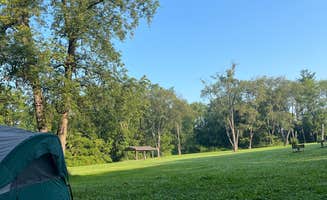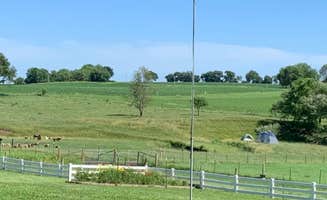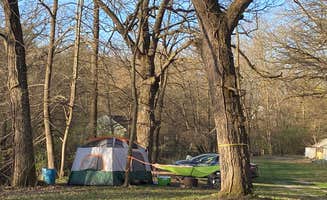Tent camping in Oregon, Illinois provides opportunities to experience the rock formations along the Rock River and Kishwaukee River corridors, with elevations ranging from 700 to 820 feet above sea level. The region's humid continental climate brings warm summers with temperatures averaging 75-85°F and moderate rainfall. Most primitive camping areas feature distinct geological features formed by ancient glaciation, creating unique landscapes uncommon in the typically flat Illinois terrain.
What to do
Paddling the Rock River: Launch kayaks from Castle Rock State Park Campground boat ramps for river exploration. "Climbing the stairs is a must! We use the boat ramps to launch our kayaks!" notes Hannah T. The river paddle offers views of sandstone bluffs and wildlife.
Hiking through prairie and forest: Walk the mowed paths around MacQueen Forest Preserve to experience both woodland and open meadow landscapes. While trails aren't extensive, Marcus D. observed: "There isn't much in terms of hiking trails. Just the main path and a few paths connecting sites and sort of a path along the river."
Stargazing in open meadows: Take advantage of the dark skies at meadow campsites. "About half of the campsites are in a meadow at the back end of the campground. It would be beautiful for stargazing!" reports Amy G. about MacQueen Forest Preserve. Light pollution is minimal, especially at sites away from nearby towns.
What campers like
Riverside privacy: Many campers appreciate the seclusion of waterfront sites. At Hennepin Canal Lock 21 Campground, Jeff and Linda L. found: "No hook-ups, just grass with a fire pit and table. Water available a couple of places along the canal. No reservations. We only saw two other campers, so lots of spaces."
Disconnecting from technology: Limited or no cell service creates a true escape. "Cell phone signal is not that great, but you really don't need it. Stars ✨ look amazing at night," explains Brian H. about his Castle Rock experience. Most primitive sites have spotty coverage at best.
Affordable camping options: Sites at MacQueen Forest Preserve provide exceptional value. Rosa G. shared about Castle Rock: "Be aware that the sites cost $6. I didn't know this despite looking online and calling for info, I only had $5. Carry cash to leave in the envelope."
What you should know
Water access considerations: Many campgrounds lack potable water. "There is no potable drinking water anywhere at any of these locks up and down the Hennepin Canal apart from at the Visitors Center, so ensure you bring your own water or a filtration system," writes Stuart K. about Hennepin Canal Lock 11.
First-come, first-served policies: Most primitive sites cannot be reserved. "Camping at the Canal is on a first-come, first-serve basis. There are no set check-in or check-out times," explains Iris A. about Hennepin Canal Lock 11. Arrive early during peak summer weekends.
Transportation challenges: Some sites require manual transport of gear. At MacQueen Forest Preserve, Amy G. describes: "You do have to walk into all of them, but they do have one wagon and a dolly you can use to tote things in. It's an easy walk, on a crushed gravel road and mowed trail."
Tips for camping with families
Accessible options: Look for sites with manageable distances for children. MacQueen Forest Preserve offers practical solutions as Marisa A. explains: "There is one wheelchair accessible tent site on a blacktop path in the forest canopy. This is a very primative campground with 1 set of Vault toilets."
Wildlife viewing opportunities: Kids can explore riverside ecosystems safely. At Lutheran Outdoor Ministries Center, Marisa A. notes: "There are over 640 acres of meadow, forest, and stocked pond. I'm not sure if it's still there, but there used to be a challenging obstacle course up a steep hill."
Bathroom facilities: Prepare children for primitive toilets. "A very clean portapotty is also available. Please note that water is not available at the campground and must be boated in," Jessica W. warns about Castle Rock. Most sites feature vault toilets rather than flush facilities.
Tips from RVers
Limited accommodations: Few primitive sites accommodate larger vehicles. At Franklin Creek State Natural Area Equestrian Campground, Stuart K. notes: "While there's not a lot in the way of amenities here, if you need a post to tie up your horse, a round-about where they can go for countless circle walks along with plenty of hay to keep them fed."
Grassy parking areas: Prepare for non-designated parking. "The grassy sites were a bit unexpected. We saw tire marks showing that people drove into the grass to set up camp," observes Art S. about Hennepin Canal Lock 21 Campground. Bring leveling blocks for uneven surfaces.
Site selection strategy: Look for sites with natural boundaries. "We were wondering if we might be the only ones there because we saw a review from two weeks prior where that was the case but it was actually a pretty popular night," noted Kaitlin B. about Castle Rock, emphasizing the importance of early arrival during peak times.





